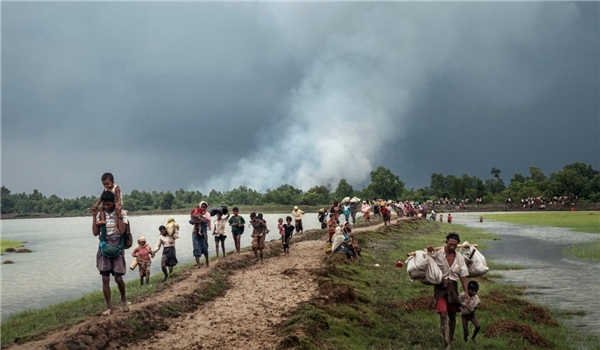
Rasa - In a joint statement, the ARU and ERC said the Myanmar government had to "address the security, human rights and citizenship issues faced by Rohingya ethnic minority before any step is taken to repatriate the forcefully displaced Rohingya from camps in Bangladesh to their original homes in Rakhine state", Anadolu Agency reported.
Voicing its serious concern over the security situation in Rohingya villages, they added that "attacks and looting by Myanmar armed forces and Buddhist Rakhine militia have spiraled over the past several days".
Myanmar government has failed to show it "genuinely works with the Rakhine Commission for implementation of Annan recommendation", according to the statement.
The groups urged Myanmar to "work with the Rakhine Commission with full transparency and due respect to the views and integrity of the Commission members, and fully implement the recommendation of the Annan Commission with benchmarks".
The ARU and ERC demanded the government to renegotiate the repatriation agreement with the involvement of the UNHCR and representatives among displaced people at Rohingya camps in Bangladesh.
They also asked Myanmar government to allow the international relief and development groups to assist in rebuilding the Rohingya villages that were razed.
The statement also called on the government to "initiate a rigorous reconstruction and rehabilitation plan for the returnees well ahead of the repatriation in coordination with the UNHCR, international aid groups, and the displaced Rohingya village representatives for their return to their original homes/properties with no transit, semi-permanent, or permanent camps".
Bangladesh and Myanmar agreed to repatriate the hundreds of thousands of Rohingya Muslims who have fled a recent army crackdown in Myanmar within a period of two years.
Concerns are growing among United Nations agencies and humanitarian groups over an agreement between the Bangladesh and Myanmar governments to repatriate several hundred thousand Rohingya refugees within two years, as, according to several reports, it is not yet safe for the hundreds of thousands of Rohingya Muslims living in refugee camps in Bangladesh to begin returning to Myanmar.
Right groups including Human Rights Watch (HRW), the UN Refugee Agency and Amnesty International have voiced their concern over the deal, saying it would send Rohingya back to the brutality in Myanmar. Amnesty called the plan "alarmingly premature" while HRW called on both governments to redraft the agreement involving the United Nations High Commissioner for Refugees.
The United Nations refugee agency stressed that Rohingya Muslim refugees in Bangladesh should be consulted and ensured of their safety before they are repatriated to Myanmar’s Rakhine state.
The UN secretary general, Antonio Guterres, said the repatriation deal needed to clarify whether Rohingya would be permitted to return to their homes or live in specially built camps.
“The worst would be to move these people from camps in Bangladesh to camps in Myanmar,” Guterres stressed.
The deal included no role for the UN refugee agency, he added, making it difficult to “guarantee that the operation abides by international standards.”
The refugees refuse to go back unless their safety can be guaranteed and Myanmars grant their demands to be given citizenship and inclusion in a list of recognized ethnic minorities. They are also asking that their homes, mosques and schools that were burned down or damaged in the military operation be rebuilt.
More than 655,000 of Myanmar's Muslim minority have fled across the border to Bangladesh since late August when the Myanmar army launched a sweeping crackdown on Rohingya Muslims in Northern Rakhine state.
The UN has already described the Rohingya as the most persecuted community in the world, calling the situation in Rakhine similar to “a textbook example of ethnic cleansing.”
The Myanmarese government, however, denies committing atrocities against the Rohingya people and has even rejected UN criticism for its “politicization and partiality.”
UN High Commissioner for Human Rights Zeid Ra‘ad al-Hussein stressed that attacks on the Rohingya had been “well thought out and planned” and he had asked Myanmar’s de facto leader to do more to stop the military atrocities.
847/940